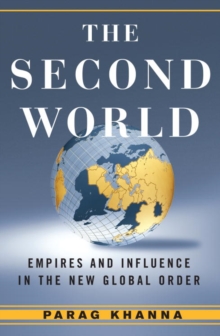Grand explanations of how to understand the complex twenty-first-century world have all fallen shortuntil now.
In The Second World, the brilliant young scholar Parag Khanna takes readers on a thrilling global tour, one that shows how Americas dominant moment has been suddenly replaced by a geopolitical marketplace wherein the European Union and China compete with the United States to shape world order on their own terms.
This contest is hottest and most decisive in the Second World: pivotal regions in Eastern Europe, Central Asia, Latin America, the Middle East, and East Asia.
Khanna explores the evolution of geopolitics through the recent histories of such underreported, fascinating, and complicated countries as Azerbaijan, Uzbekistan, Colombia, Libya, Vietnam, and Malaysianations whose resources will ultimately determine the fate of the three superpowers, but whose futures are perennially uncertain as they struggle to rise into the first world or avoid falling into the third.Informed, witty, and armed with a travelers intuition for blending into diverse cultures, Khanna mixes copious research with deep reportage to remake the map of the world.
He depicts second-world societies from the inside out, observing how globalization divides them into winners and losers along political, economic, and cultural linesand shows how China, Europe, and America use their unique imperial gravities to pull the second-world countries into their orbits.
Along the way, Khanna also explains how Arabism and Islamism compete for the Arab soul, reveals how Iran and Saudi Arabia play the superpowers against one another, unmasks Singapores inspirational role in East Asia, and psychoanalyzes the second-world leaders whose decisions are reshaping the balance of power.
He captures the most elusive formula in international affairs: how to think like a country.In the twenty-first century, globalization is the main battlefield of geopolitics, and America itself runs the risk of descending into the second world if it does not renew itself and redefine its role in the world.
Comparable in scope and boldness to Francis Fukuyamas The End of History and the Last Man and Samuel P.
Huntingtons The Clash of Civilizations and the Remaking of World Order, Parag Khannas The Second World will be the definitive guide to world politics for years to come.A savvy, streetwise primer on dozens of individual countries that adds up to a coherent theory of global politics.Robert D.
Kaplan, author of Eastward to Tartary and Warrior PoliticsA panoramic overview that boldly addresses the dilemmas of the world that our next president will confront.Dr. Zbigniew Brzezinski, former national security advisorParag Khanna's fascinating book takes us on an epic journey around the multipolar world, elegantly combining historical analysis, political theory, and eye-witness reports to shed light on the battle for primacy between the world's new empires.
Mark Leonard, Executive Director, European Council on Foreign Relations Khanna, a widely recognized expert on global politics, offers an study of the 21st century's emerging geopolitical marketplace dominated by three first world superpowers, the U.S., Europe and China...
The final pages of his book warn eloquently of the risks of imperial overstretch combined with declining economic dominance and deteriorating quality of life.
By themselves those pages are worth the price of a book that from beginning to end inspires reflection.Publishers WeeklyFrom the Hardcover edition.


